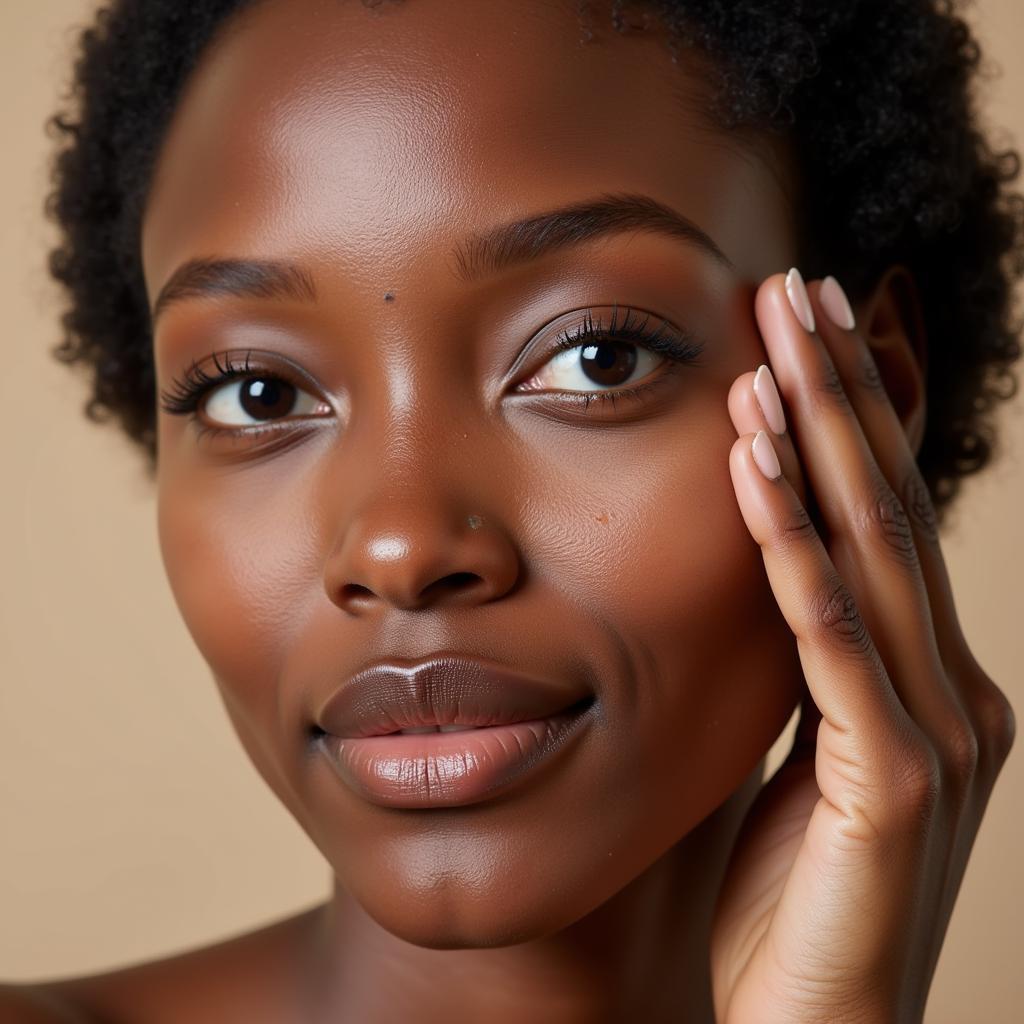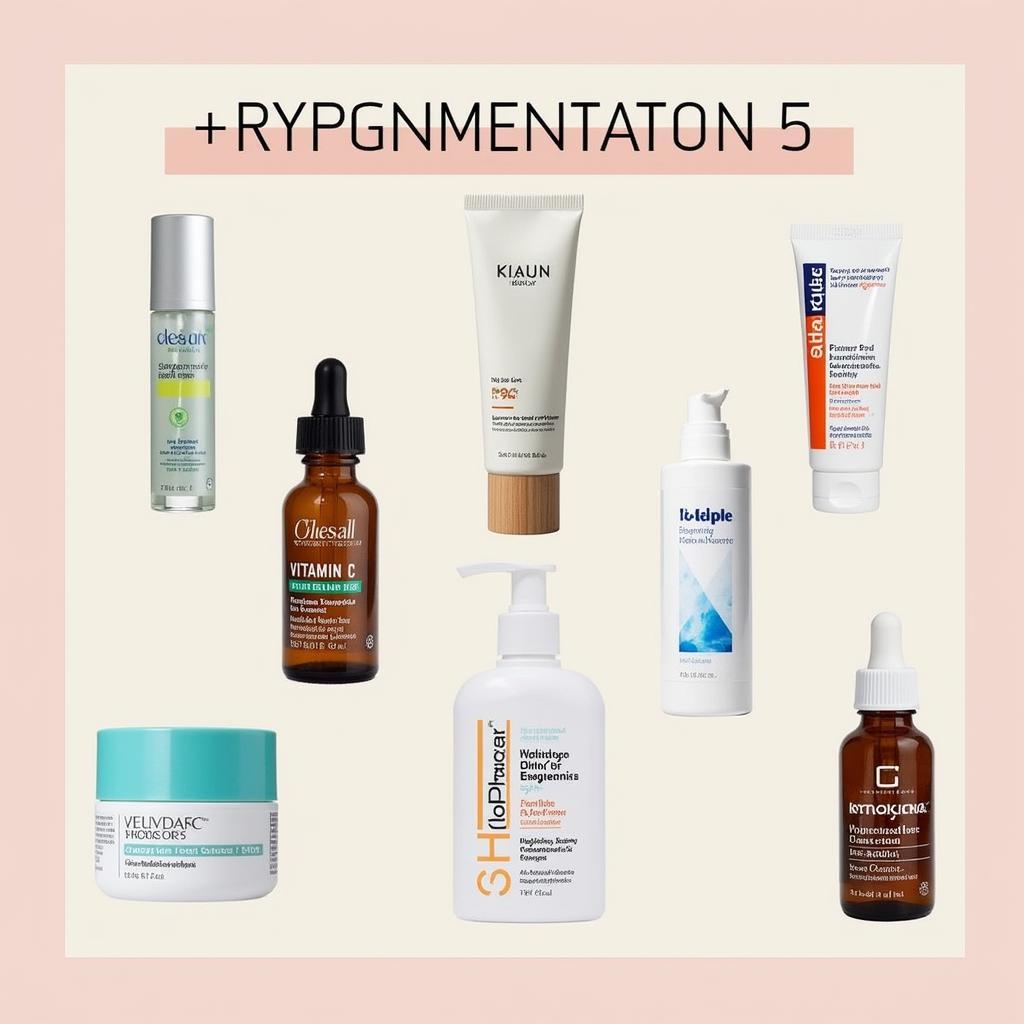Understanding and Treating African American Hyperpigmentation
African American hyperpigmentation is a common skin concern characterized by the darkening of patches of skin. This occurs when the skin produces an excess of melanin, the pigment responsible for skin color. While generally harmless, hyperpigmentation can cause self-consciousness and affect one’s confidence. This article delves into the intricacies of this condition, explores various treatment options, and provides valuable insights to help individuals manage and improve their skin health.
 Woman Examining Skin for Hyperpigmentation
Woman Examining Skin for Hyperpigmentation
What Causes Hyperpigmentation in African American Skin?
Several factors contribute to hyperpigmentation in people of color. Understanding these causes is crucial for effective treatment and prevention.
- Post-inflammatory Hyperpigmentation (PIH): This is the most common type of hyperpigmentation in African Americans, occurring after skin inflammation or injury. Acne, eczema, and psoriasis are common triggers.
- Sun Exposure: Ultraviolet (UV) radiation from the sun stimulates melanin production, leading to skin darkening and hyperpigmentation.
- Hormonal Changes: Fluctuations in hormones, particularly during pregnancy (melasma) or due to certain medical conditions, can trigger hyperpigmentation.
- Skin Injuries: Cuts, burns, or other injuries can result in hyperpigmentation as the skin heals.
- Certain Medications: Some medications, like certain antibiotics and hormonal therapies, can increase melanin production and cause hyperpigmentation as a side effect.
Effective African American Hyperpigmentation Treatment Options
Fortunately, numerous treatments can effectively address hyperpigmentation in African American skin. It’s essential to consult a qualified dermatologist to determine the best course of action for your specific needs and skin type.
1. Topical Treatments:
- Hydroquinone: This topical agent lightens the skin by inhibiting melanin production. It’s available over-the-counter and in prescription-strength formulations.
- Retinoids: Derived from vitamin A, retinoids promote skin cell turnover and help fade hyperpigmentation over time. They are available in various forms, including creams, gels, and serums.
- Kojic Acid: A natural ingredient derived from mushrooms, kojic acid inhibits melanin production and has mild exfoliating properties.
- Azelaic Acid: Found naturally in grains, azelaic acid effectively reduces hyperpigmentation, particularly PIH, by inhibiting tyrosinase, an enzyme involved in melanin synthesis.
- Vitamin C: This potent antioxidant helps protect against sun damage and brighten the skin.
 Dermatologist Consultation for Hyperpigmentation
Dermatologist Consultation for Hyperpigmentation
2. Chemical Peels:
Chemical peels utilize solutions to exfoliate the outer layer of skin, revealing brighter, more even-toned skin underneath. Different types of peels, such as glycolic acid peels and salicylic acid peels, target varying depths of the skin and can be tailored to address specific hyperpigmentation concerns.
3. Microdermabrasion:
This minimally invasive procedure uses fine crystals to gently exfoliate the top layer of skin, improving the appearance of hyperpigmentation, fine lines, and wrinkles. Multiple sessions are often recommended for optimal results.
4. Laser Treatments:
Laser therapy targets and destroys melanin-producing cells in the skin, effectively reducing hyperpigmentation. Different types of lasers, such as fractional lasers and intense pulsed light (IPL) devices, cater to various skin tones and concerns.
5. Home Remedies and Lifestyle Changes:
While not a substitute for professional treatments, certain home remedies and lifestyle changes can complement professional treatment and promote overall skin health.
- Sun Protection: Consistent and diligent use of broad-spectrum sunscreen with an SPF of 30 or higher is crucial in preventing further hyperpigmentation.
- Gentle Exfoliation: Regular exfoliation with gentle scrubs or chemical exfoliants can help remove dead skin cells and promote cell turnover.
- Aloe Vera: Known for its soothing and anti-inflammatory properties, aloe vera gel can be applied topically to soothe irritated skin and minimize the appearance of hyperpigmentation.
 Skincare Products for Hyperpigmentation
Skincare Products for Hyperpigmentation
Seeking Professional Guidance for Hyperpigmentation
It’s crucial to seek professional advice from a board-certified dermatologist or a qualified skincare professional for personalized recommendations. They can accurately diagnose the cause of your hyperpigmentation, determine your skin type, and recommend the most effective treatments and skincare regimen for your individual needs.
